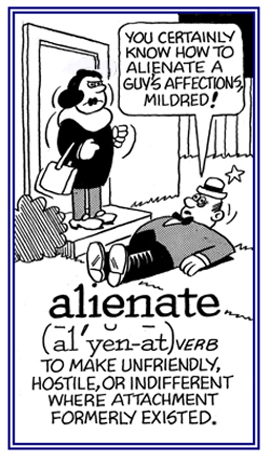ali-
(Latin: other, another)
Prout multis ut faciant vobis homines, et vos facite illis similiter; "As you would that men should do to you, do you also to them in like manner." From Luke 6:31 of the Latin Vulgate, a Latin version of the Bible produced by Saint Jerome in the 4th century.
From Latin vulgata editio, "an edition made public" or "an edition for ordinary people" which is a version used by the Roman Catholic Church.
This strongly suggests that someone's present efforts will prove fruitless so, "We must go back and try another approach."
To keep the police off his tracks, the criminal assumed an alias whenever he moved to live in another place.
2. At another time; in another place; in other circumstances; otherwise: In the alias of the last century, Mr. Smith was known as Lord J. C. Wigglebottom.3. In the field of electronics, a misleading electronic signal that is technologically generated: The computer expert recognized the aliases and was able to modify the program to overcome the difficulties.

Go to this Word A Day Revisited Index
so you can see more of Mickey Bach's cartoons.
"Samuel Langhorne Clemens, alias dictus was Mark Twain (1835 - 1910), who was an American author who wrote The Adventures of Tom Sawyer among several other novels."
2. Etymology: from Latin alias, "otherwise, at another time". Also from Latin dictus, the perfect passive participle of dico, "to say".2. An explanation offered to avoid blame or justify action; an excuse: As an alibi, Mark told his mother that he was helping the neighbor and that was why he didn't finish his homework for school.
2. To make an excuse for another person: Mary alibied her daughter's absence from school by writing a note to the teacher saying that she was sick and had to stay in bd..
2. Anyone who does not belong to, or does not feel accepted by, a group or society: Judy felt like an alien when she moved to the new town and all her neighbours just stared at her and not saying a word.
3. A being from another planet, or another part of the universe: Grace watched a science fiction movie with aliens from an unknown planet.
Expressed by Seneca, in his writing titled, On Anger.
2. To cause someone to change his or her previously friendly or supportive attitude and to become unfriendly, unsympathetic, or hostile: The disagreement between the two girls who lived together alienated their warm sociability with each other.
3. To make someone feel that he or she does not belong to or is not allowed to share in something, or is isolated from it: People with a meagre amount of income often feel alienated from society.
4. To cause something, especially someone's affections, to be directed toward somebody or something else: Susan was very upset with her boyfriend's rude behaviour towards her, which alienated, or induced, her to move out of their apartment and find a new one for herself.
5. To transfer property, or a legal right, to the ownership of another person, especially by an act of the owner rather than by inheritance: Gregory, the landlord of the condo, decided to alienate his home to his wife before he got too old so that she would be the titleholder of it.

Go to this Word A Day Revisited Index
so you can see more of Mickey Bach's cartoons.

Go to this Word A Day Revisited Index
for a list of additional Mickey Bach illustrations.
Another version is, "No use trying to keep a secret." A warning that when more than one person knows something, it is no longer a secret because there is usually someone who will talk about it.
From Publius Ovidius Naso (43 B.C. - c. A.D. 17).
Inter-related cross references, directly or indirectly, involving word units meaning "another, other, different, alternating, changing": allo-; alter-; allelo-; hetero-; mut-; poikilo-; reciproc-; vari-.

